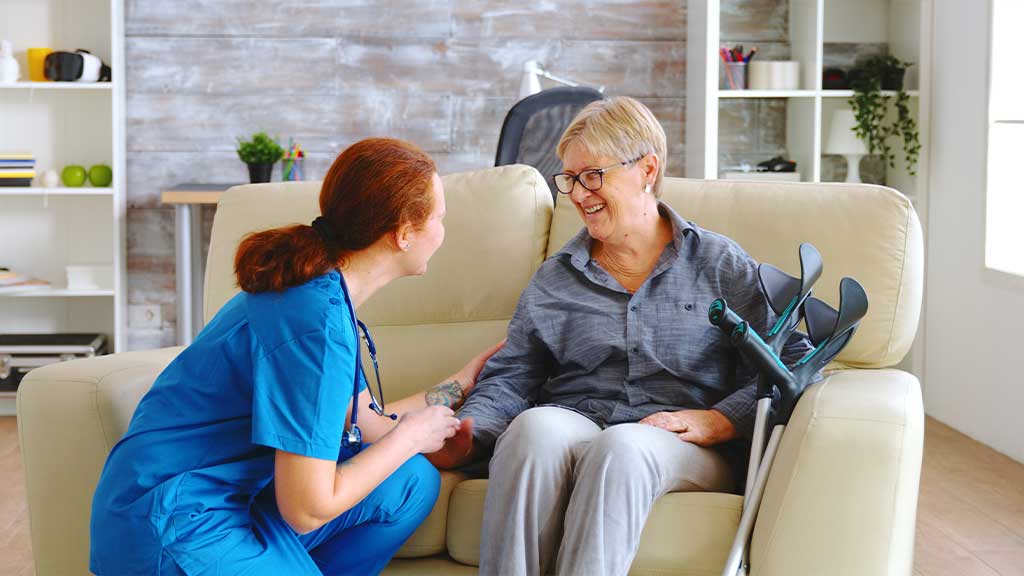Dementia is one of the catastrophic health conditions that strike when people approach 65 years of age and older. When it sets in, it can drastically affect the quality of life of the patient, creating the need for extra attention and care. Families and caregivers often find it challenging to care for people with dementia due to changes in their memory that also affect their behaviors.
This makes it necessary for families, as well as caregivers, to find ways how to cope with dementia patients. Taking care of a loved one with dementia isn’t a single person’s duty. It demands the coordination of family members and caregivers. Most importantly, since caregivers spend most of the time with the patient, they need to know caring for someone with dementia tips.
Why Dementia Patients Experience Behavioral Changes
Before getting to the dementia caregiver tips, understanding why dementia changes patients’ behavior is important in providing optimal care. Research on the behavior of dementia patients highlights that more than 90% of the people suffering from this condition experience behavioral changes. These changes can take a big toll on family, friends, and caregivers.
Behavioral changes can be attributed to many different reasons, but the most common is because some parts of the senior’s brain are losing cells. The type of behavior you see often depends on the affected part of the brain. For example, if the frontal lobe is affected, the patient is likely to experience a loss of focus, lack of attention, and lack of motivation. Planning and maintaining focus for extended periods becomes a challenge. Also, they may become insensitive, rude, and hostile since the frontal lobes are also responsible for impulse control.
People with dementia may also experience changes in their behavior in response to their surroundings. Alzheimer’s Disease, one of the causes of Dementia, may cause a person to have problems following conversations. Due to their inability to follow events happening around them, patients may become defensive, which can extend into anger or frustration.
Common Behavioral Changes in Dementia Patients

Different types of dementia may cause the person to start behaving differently. These changes in behavior become more evident and distressing, especially in the medium to advanced stages. Both family members and caregivers may feel frustrated with these changes. This explains why it’s important to know these behavioral changes and determine how to respond.
Some of the most common behaviors to expect include:
Repetitive actions and conversions
You may notice that a senior with dementia repeats a question or conversation they just had a few minutes earlier. They may also repeat activities more and more, to the extent of causing distress.
Restlessness
Dementia patients may become more restless and move up and down. They may also fidget more as they wander around.
Sleeplessness
Lack of sleep is a common trait, where the person stays awake all night or experiences sleep disturbances.
Aggressiveness and rudeness
Some may become rude, aggressive, or even abusive. This makes it particularly important to know how to deal with dementia patients who are aggressive. Otherwise, a person may respond with aggression without knowing that the patient isn’t in their right state.
Low self-confidence
They may also express a lack of self-confidence in activities they once enjoyed, which may turn out to be disinterest or apathy.
If you’re caring for parents with dementia at home and showing these behaviors, it’s vital to understand them, even though it’s not always easy. It can be more reassuring if you remember that such behaviors are a way for them to express or communicate how they feel.
At times, these behaviors may not be a direct symptom of dementia, but rather a result of feeling frustrated. Dementia patients may also react in strange ways as a response to environments that have become confusing for them.
How To Cope with Dementia Patients

Although it can be distressing to deal with a family member with dementia, it can be more helpful to determine if there are particular triggers. One way to find out is to ask yourself some of these questions:
- Are some behaviors more prevalent at certain periods of the day?
- Is the current home setting too cluttered, noisy, or confusing for the person?
- Do they respond with these behaviors when asked to do something that they don’t want to?
By keeping a detailed diary of the senior’s responses for about 2 weeks, it can help you determine some of the triggers.
In most situations, if they suddenly change their behavior, it could be as a result of underlying health issues. They could be experiencing discomfort due to constipation or pain from an infection. This may require a medical assessment to figure out the issue and correct it.
Also, it’s important to maintain an active social lifestyle, activities they love, and regular exercise. These can help, to a great extent, reduce out-of-character behaviors.
Tips for Communicating with Dementia Patients
As dementia advances, communicating with the person becomes more challenging. You notice that you cannot talk to someone with dementia the same way as they were “themselves.” The main cause of problems with communication is that they cannot remember things.
Also, a dementia patient becomes easily agitated, anxious, and aggressive. In other types of dementia, language abilities deteriorate in that they cannot find the right word during conversions. At times, they may repeat themselves a countless number of times. These communication challenges may make you feel impatient or frustrated, but it’s crucial to understand that they’re caused by the disease.
To improve your communication with a dementia patient:
- Converse in a reassuring voice. Speak calmly and listen to their concerns. Try as much as possible to show empathy, especially if they’re fearful or frustrated. This is one of the most effective ways to deal with angry dementia parents.
- Give them more personal space and allow them to have as much control over their lives as possible.
- Keep sentimental objects or photographs of loved ones within their vicinity to make them feel more comfortable.
- Each time, try to introduce yourself to them as if they don’t know you. However, don’t use phrases like, “Don’t you remember me?”
- Try to converse in open-ended conversions that prompt them to respond.
- Introduce a familiar activity like looking at photos in an album, especially if word conversion has become problematic for them.
Tips for Assisted Daily Living Activities for Dementia Patients

During the early phase of Alzheimer’s Disease and other forms of dementia, a person’s thinking, memory, and reasoning are affected. As a result, their daily lives and related activities become affected. Eventually, family members and caregivers must help them with activities of daily living (ADL).
So, you need to know how to cope with dementia patients when it comes to ADL, such as grooming, bathing, dressing, cooking, etc. It may not be easy for a person who was once independent to need help with these basic chores. Here are a few dementia caregiver tips you can use to help with ADL:.
- Maintain a consistent routine for activities such as eating, sleeping, bathing, and dressing.
- Help the care recipient write a to-do list, events, and appointments in a calendar or notebook.
- Set activities that the person enjoys at the same time every day.
- Use a reminder mechanism to help seniors who need to regularly take medication.
- Dress dementia care patients in easy-to-put-on and loose-fitting clothing. Consider clothes with fabric fasteners, large zippers, and elastic waistbands. Avoid clothing with buckles, buttons, or laces.
- Always serve meals at consistent times in a familiar place. Allow them enough time to chew and swallow food.
- During bathing, ensure they sit on a sturdy chair to prevent falling.
- Always preserve the person’s dignity and show respect at all times. Before starting an activity, tell the person what you’re about to do. Guide them with a kind tone in every step as you allow them more control of the activity.
Tips for Maintaining Safety for Dementia Patients
Both family members and caregivers need to make the dementia patient’s surroundings safer and more comfortable. When caring for parents with dementia at home, remove all hazards and replace them with safe features to help them move freely and safely. Additionally, try the following tips:

- Ensure staircases have at least a single handrail. Cover the steps with grip strips or carpet to prevent slipping. Also, ensure the stair edges are marked with bright colors to make them more visible.
- Remove unused items, electrical cords, small rugs, and other things that cause tripping accidents.
- Keep unused electrical outlets sealed with safety plugs.
- Maintain good lighting for all outdoor areas and rooms.
- Keep cleaning products and reagents out of sight or locked away.
Tips For an Active Lifestyle for Dementia Patients
People with dementia need to maintain an active lifestyle, just like everyone else. However, as the disease advances, you may find it more challenging to help them maintain an active lifestyle or eat healthily. Here are a few useful tips to help you:
- Mix different activities to help the dementia patient stay active. For instance, encourage them to assist with light household chores, baking, and gardening.
- Participate in the activities to make them interesting, since they may lack the initiative.
- Make exercise activities more fun with music. Join in and help them feel more confident in the activities.
- Don’t prolong activities, as this may make them resent them. Instead, choose short workout sessions.
- Go for a walk together daily.
- Give them the freedom to choose what they’d like to do or eat by giving them suggestions.
Caring for a dementia patient can be overwhelming for both family members and caregivers. It requires time, effort, and commitment to achieve results. However, if caring for them has become too difficult, it may make you wonder when should someone with dementia go into a care home.
If the dementia patient develops severe symptoms, and you feel that their safety and health are at risk, it’s best to transfer them to a care home. A care home setting is also more suitable if the dementia patient cannot entirely perform activities of daily living.
Summary
Making decisions for a person who can no longer do it for themselves can be overwhelming. When dementia kicks in, a person’s abilities and behaviors are affected. The changes in behavior can be particularly distressing. This is why family members and caregivers must learn how to cope with dementia patients.
Taking caregiver courses can greatly help a caregiver master the skills to deal with dementia patients who are aggressive, rude, or stubborn. With a certification, it also showcases expertise in handling dementia patients in a way that preserves their dignity.
FAQs
What is the simplest strategy to successfully talk to someone with dementia?
Speak with a clear, slow but reassuring voice while maintaining eye contact. Avoid correcting them or arguing but instead, reassure and validate their responses.
What can help me manage the difficult behaviors of a dementia patient?
Start by identifying what triggers certain behaviors, like aggression or agitation. Maintain a diary of these behaviors and, when they mostly occur, to help you identify triggers. Redirect them to more calming activities away from the triggers.
How can I make the daily activities of a dementia patient more effective?
Choose short activities, or break long ones into smaller ones with reminders or cues. Participate in the activities and help them, while also promoting their independence.
How can I make the surroundings of a dementia patient safer?
Identify and remove potential hazards like sharp objects and slippery floors. Ensure staircases have a grab bar while the edges of steps are highlighted with bright colors. You can also use GPS trackers to monitor their movement.
When should someone with dementia go into a care home?
If taking care of a dementia patient has become almost impossible due to their worsening condition, it’s best to transfer them to a care home. Also, you can move them to a care home if their health and safety are at a higher risk while at home.


![Self-Care for Caregivers [Tips from Experts]](https://caregivercourses.net/wp-content/uploads/2024/07/Self-Care-for-Caregivers-Tips-from-Experts-300x169.jpg)


